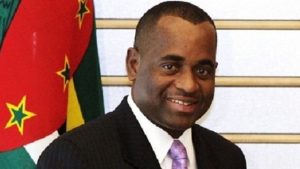
Dominica Prime Minister Roosevelt Skerrit
ROSEAU, Dominica (CMC) — Prime Minister of Dominica, Roosevelt Skerrit, has defended the economic policies of his administration and dismissed suggestions that the island could be seeking assistance from the International Monetary Fund (IMF).
Winding up debate on the EC$918.2 million (US$339.7 million) budget on Tuesday night, Skerrit told legislators that the island’s debt to gross domestic product (GDP) is within a manageable range.
“Our debt to GDP is not a 120 per cent or more. That’s when the IMF comes in, when your debt to GDP is 120 (per cent) plus. They are coming to rescue you.
“Our debt to GDP ratio, our national debt now stands at 67 per cent and if you take out our guarantees for the AID Bank and to DOWASCO it will be 51 per cent,” Skerrit told Parliament, adding that guarantees to DOWASCO is to bring portable water to every part of Dominica.
He said the guarantee to the AID Bank is to provide cheaper financing to the private sector to create jobs.
“So it is an investment. So we don’t want any IMF prescription.
“IMF is our friends, they are my friends, I like them they like me too, but we don’t need them because they have confirmed Madam Speaker that there is no fiscal unsustainability in Dominica at this stage.”
During his contribution to the debate, Opposition Leader Lennox Linton said that since 2005 the Dominican economy has struggled to maintain a growth rate of less than one per cent on average, well below economic performances in the rest of the region and significantly less than the five to seven per cent required to generate sustained employment and to reduce the growing incidence of poverty on the island.
“Repeated policy action in budget after budget presented by this administration have failed to address economic growth and Dominica’s growing unemployment problems with the resultant social ills, which continue to plague our country,” he said.
He told legislators that this year’s budget surfaces against the backdrop of some very interesting disclosures in the IMF’s March, 2017 Article IV consultation on Dominica.
He said that over the past 17 years the Washington-based financial institution has made recommendations for the Dominica economy including the need for improving the conditions for private investment, especially for export activities as the key to accelerating growth.
“These IMF recommendations for an economy managed by a group, which, according to the prime minister, should be “unafraid to regularly expose itself to independent expert scrutiny” are contained in a press statement issued by the mission chief at the end of the Article 4 consultation in March 2017. But four months later, the full Article 4 report is yet to be published.”
Linton said that the IMF executive board in May considered and endorsed the appraisal without a meeting.
“I understand the IMF executive board to be saying, the 2017 Article 4 report is in the hands of the Dominica authorities and those authorities have not yet decided to publish it. And I wonder why,” he added.
But, Skerrit said Linton’s response to the budget was lacking, adding: “it made no mention of the bold steps to make our income tax rates more competitive, boosting incentives to work and the need to develop an entrepreneurial spirit and character in our society”.
Skerrit said it does not matter whether or not the opposition agrees with the policies outlined in the fiscal package, saying: “every single one of the policies enunciated in this budget address will affect in a positive way the lives of every single citizen of our society”.
